
What is the basis of Jewish law? This is not a trick question. The safest answer, surely, is the Torah.
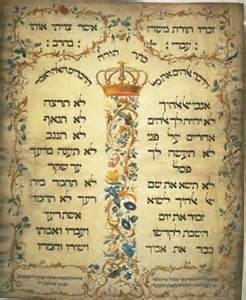 And we here are using Torah as a synonym for the word of God, as found in Tanakh, the holy scriptures. But if you ask what is the definitive code of Jewish law, the best answer is not the Torah, but the Talmud. The Talmud is divided into two main parts, the Mishnah and the Gemara, both written centuries after the final canonization of Tanakh. The Mishnah is remarkably self-contained. It is a discussion of law by sages, providing various opinions, along with some indication of what was the consensus view among them. But the Mishnah devotes almost no space to explaining how the sages reached their conclusions—it just states opinions, not explanations. The Gemara, written several hundred years later is more expansive, with more discussion of the law, exploration of hypothetical cases, and some attempt to provide justifications for rabbinic rulings, usually in the form of prooftexts, citations to biblical verses that appear to bolster the case for the point under discussion.
And we here are using Torah as a synonym for the word of God, as found in Tanakh, the holy scriptures. But if you ask what is the definitive code of Jewish law, the best answer is not the Torah, but the Talmud. The Talmud is divided into two main parts, the Mishnah and the Gemara, both written centuries after the final canonization of Tanakh. The Mishnah is remarkably self-contained. It is a discussion of law by sages, providing various opinions, along with some indication of what was the consensus view among them. But the Mishnah devotes almost no space to explaining how the sages reached their conclusions—it just states opinions, not explanations. The Gemara, written several hundred years later is more expansive, with more discussion of the law, exploration of hypothetical cases, and some attempt to provide justifications for rabbinic rulings, usually in the form of prooftexts, citations to biblical verses that appear to bolster the case for the point under discussion.
A Plea For Reason: An Open Letter to Prime Minister Netanyahu—by Alon Ben-Meir
 Dear Prime Minister Netanyahu,
Dear Prime Minister Netanyahu,
I write this letter to you with a heavy heart as it pains me deeply to see the beautiful dream of a strong and proud Israel, the country that was expected to embrace what is virtuous, moral, and just, now losing its reason for being—as a free and secure Jewish state living in peace and harmony with its neighbors.
The state’s social fabric is being torn apart by political divisiveness and economic injustice. The country is increasingly isolated, degenerating into a garrison state surrounding itself with walls and fences, vilified by friends and reviled by enemies.
The Statue of Liberty is Going to Canada—by Ayala Emmett
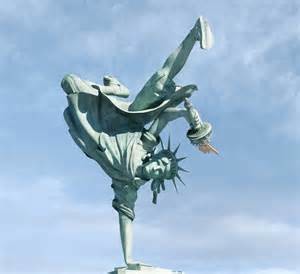
Relocating
to Canada
Supernatural stories and diplomatic missives have recently surrounded the Statue of Liberty. First, a man claimed to have captured three UFOs in a photo of the Statue of Liberty. Then, according to the Washington Post the statue gave Senator Cruz the middle finger after he made disparaging remarks about New York values. On the campaign trail, Donald Trump who resented the attention on his rival told the Statue of Liberty to reject all Muslims.
Lately, the buzz has been that the French are insisting on taking back their 1886 historic gift to America and to relocate the Statue of Liberty to Canada. It turns out that the spirit of the sculptor Auguste Bartholdi is demanding it. Why would Bartholdi treat us like modern Hamlets? What have we done that he would appear as a Parisian apparition demanding a Hamlet-like action?
Without Trial and No Evidence—by Ayala Emmett*
 Israelis, human rights organizations, and the United Nations call to end the practice of administrative detention. This practice has recently taken on a face and a name of a Palestinian journalist, Mohammed al-Qiq from the village of Dura. Al-Qiq, who was arrested and held without charges, demanded a trial to end his detention. When his request was denied al-Qiq went on a hunger strike that today Thursday, February 17 is on its 84th day. His hunger strike has revealed the cruelty of the process in which detainees are powerless to seek legal justice and exposed in full public view the horror of their use of hunger as a last resort.
Israelis, human rights organizations, and the United Nations call to end the practice of administrative detention. This practice has recently taken on a face and a name of a Palestinian journalist, Mohammed al-Qiq from the village of Dura. Al-Qiq, who was arrested and held without charges, demanded a trial to end his detention. When his request was denied al-Qiq went on a hunger strike that today Thursday, February 17 is on its 84th day. His hunger strike has revealed the cruelty of the process in which detainees are powerless to seek legal justice and exposed in full public view the horror of their use of hunger as a last resort.
Hammered Work—by Michael Aronson

made from a
sing piece of gold.
We read in this week’s Torah portion, “You shall make a lampstand [menorah] of pure gold; the lampstand shall be made of hammered work; its base and its shaft, its cups, calyxes, and petals shall be of one piece.” (Shemot 25:31). The text emphasizes that all of the structural and aesthetic elements of the menorah are a part of its being. The menorah is one, constructed as an essential unity and not from diverse prefabricated parts.
How difficult would it be to carve a menorah out of a block of solid gold? Perhaps, when God chose Bezalel and Oholiav (Parshat Ki Tissa), He helped them see the menorah within the raw material. They knew what to do on instinct. This would have made things easier.
Charitable Gifts in the Exodus Journey—by Ayala Emmett
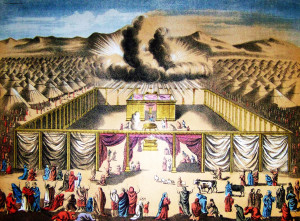
For the Israelites, a multitude of former slaves, coming out of Egypt was a time in which they had to transform themselves into a unified, covenantal and ethical community. No single act on the journey sealed the deal of becoming a collective with common ties, not the dramatic exodus from Egypt, nor the miraculous parting of the sea, not even receiving the Ten Commandments; yet each act provided a necessary layer for the process of becoming unified.
Last week’s Torah reading Exodus 21-24 offered a signature act in community making as the Israelites entered a covenantal relationship with God and said in one voice “we will do.” In that historic moment the people affirmed their relationship with God and agreed to be an ethical community, to follow a set of rules and laws that would structure their personal and collective life. A critical element in becoming an ethical community was the reminder to the Israelites that they were strangers in the land of Egypt and that obligated them forever to treat with fairness and compassion the stranger, the orphan, the widow and by extension the marginalized, refugees, undocumented migrants, people with disabilities and all those who are victimized and powerless.
Is Ferguson Ready for Justice?—by Ayala Emmett*

On August 13, 2014 we saw on our television screens armored vehicles carrying mounted gunners pointing ominously at unarmed grieving people. This militarized presence of police in Ferguson Missouri was there to disperse a grieving community protesting the killing of Michael Brown a young black teenage man about to start college. Eighteen months after the shooting of Michael Brown the Department of Justice filed a civil lawsuit against the city of Ferguson. Yesterday, Attorney General Loretta Lynch said, “Residents of Ferguson have suffered the deprivation of their constitutional rights” and in 2014 we had witnessed a display of this kind of trampling of citizens’ constitutional rights, “of using force without legal justification.”
To Hear Our Prayers—by Matia Kam
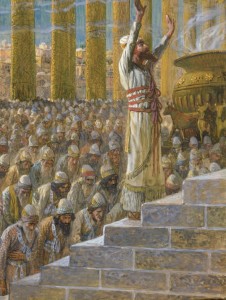
Dedicates the Temple
of Jerusalem
The Temple in Jerusalem as a House of prayer for the Israelites – individuals in times of need and the nation in times of crisis – is mentioned for the first time in King Solomon’s prayer. The Temple in Jerusalem would be a place where “every prayer and petition offered by a human being (Adam)… with palms turned toward this House, You will hear it up there in Heaven the place of Your Dwelling.” Beyond the particular peoplehood and nation King Solomon designated and consecrated the Temple as a universal house of prayer for all of humanity that would include “the strangers, the non-Israelite who is coming to pray in this House. You will hear their prayers up above in the place of Your Dwelling.” *
Don’t Demolish! Recognize Arab-Bedouins in Negev—By Phyllis Bernstein
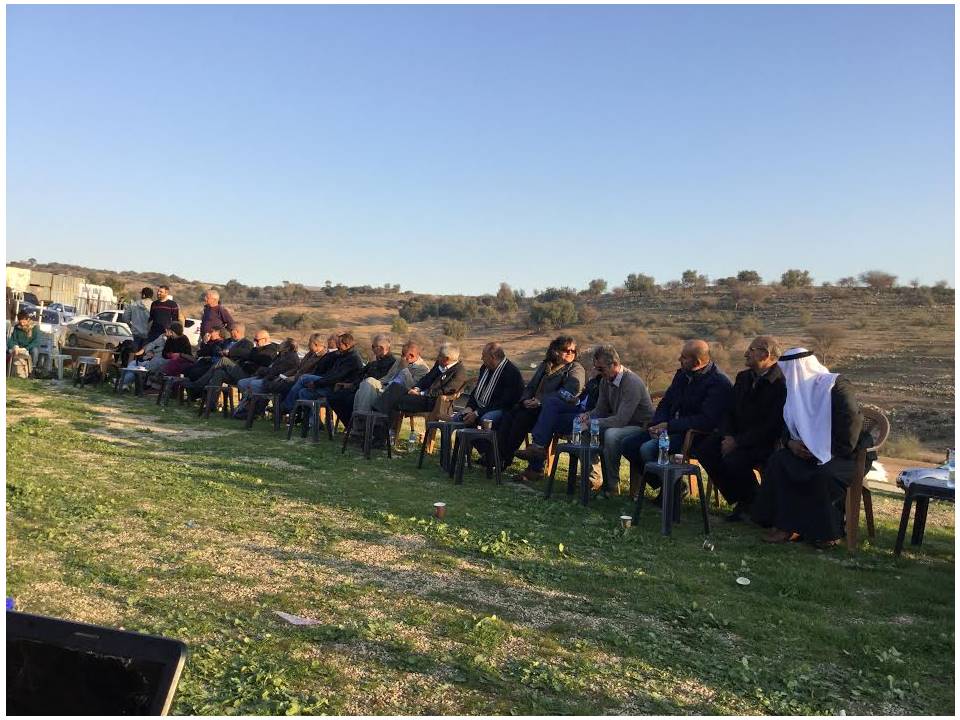
Again, and yet again, thousands of Negev Bedouin (Arab citizens of Israel) live under threat of home demolition. Today I will focus on mostly 1,200 victims from Negev villages of A-Tir and Um Al-Hiran.
Here is what we might read in a few months… The Israel Land Administration (ILA), with the assistance of an unusually large police force and IDF soldiers, demolished dozens of tin shack homes in unrecognized Bedouin villages Um Al-Hiran and A-Tir in the northern Negev.
The ILA is destroying the village and evacuating the inhabitants so that a Jewish Community named “Hiran” can be established in the area and the Yatir forest can be expanded.
The Lady or the Tiger: Some Theses—by Peter Eisenstadt
 1) The question of the hour for liberal Democrats is the choice. Who will it be? For those living in South Carolina, where the primary is coming up in a few weeks, the decision is imminent.
1) The question of the hour for liberal Democrats is the choice. Who will it be? For those living in South Carolina, where the primary is coming up in a few weeks, the decision is imminent.
2) Hillary Clinton has been at the forefront of American politics for an astonishingly long time, for a quarter-century. No one else on the scene from the early 1990s, including her husband, is still a major political player. It is a career with few parallels, male or female, in recent American political history.